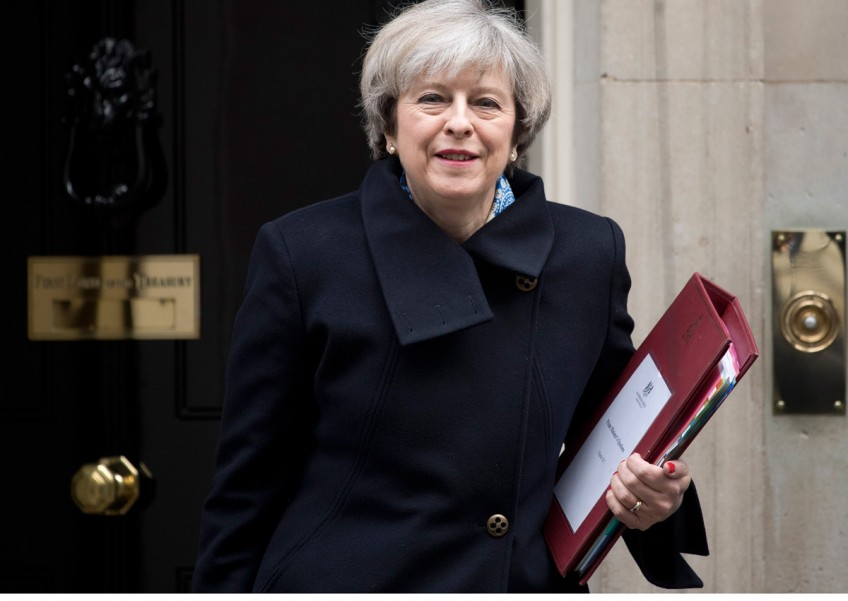Lords and Scots add to Theresa May's Brexit woes

British Prime Minister Theresa May's quest to get a free hand from Parliament for the negotiations on the country's departure from the European Union looks set to be rebuffed by the House of Lords, the upper parliamentary Chamber, which is determined to impose conditions on such negotiations.
And in a further warning of the serious challenges that lie ahead for the British premier, Mrs May is travelling to Scotland tomorrow in a bid to head off growing demands from separatists for a Scottish independence referendum before Britain leaves the EU.
Ever since Britons narrowly voted to leave in a referendum held last June, Mrs May has spent months arguing that she did not need a mandate from the British Parliament to negotiate the future Brexit deal - as the separation from the EU is now popularly known - because EU membership was purely a foreign policy matter, which, according to the country's constitutional practice, can be handled by the government alone.
But Britain's Supreme Court decisively rejected her argument in January, forcing Mrs May to seek a mandate from Parliament before she can begin the Brexit haggling.
Initially, that did not prove an onerous task. Mrs May's request for a free hand in negotiations was approved by a crushing majority of 494 lawmakers - against only 122 - in the House of Commons, the Lower House of Parliament.
Matters are different in the House of Lords, where Mrs May's government does not have a majority. Traditionally, the Lords, who are unelected, do not obstruct matters that enjoy popular support.
But this time, the Lords insist on their right to influence the conditions of a move they regard as critical to the country's future.
The Lords want to force Mrs May into revealing what she proposes to do with the estimated 3.3 million EU citizens who are already settled in Britainand who might lose their right to stay after Britain departs from the EU.
The Lords also want to be consulted during the negotiations, rather than just be presented with a final Brexit deal when the EU talks end.
Mrs May does not oppose the idea of granting all EU citizens already settled in Britain the right to stay as long as they wish.
But she does not want to offer that concession before she knows the fate of an estimated two million Britons residing in other EU member-states.
And, as she frequently puts it, she is determined to avoid providing a "running commentary" to Parliament during her European negotiations.
Mrs May has until next Tuesday to persuade the Lords to drop their demands. If she fails, her only other option is to ask the House of Commons to overturn the conditions imposed by the Upper House.
Yet she's got to be careful, for even in the Commons, where she holds a majority, many MPs might end up supporting the Lords' demands.
Read also: UK government takes first step towards triggering Brexit
A similar balancing act,with even higher stakes, is required of her in Scotland, where a majority of the population voted to remain in the EU, and where Ms Nicola Sturgeon, leader of the autonomous government, is demanding a referendum on independence, arguing that Scotland would otherwise be dragged out of the EU against its wishes.
Opinion polls show that a majority of Scots would reject an independence option today, just as they did when a referendum on the topic was held in 2014.
But Ms Sturgeon, a wily politician adept at exploiting every opportunity to advance Scotland's independence, is pushing for another referendum on the assumption that the British government will run into trouble in its Brexit negotiations, boosting demands for Scottish independence.
The Prime Minister cannot be seen to be rejecting the demand for an independence referendum, for that could also be exploited by Ms Sturgeon to whip up anger against the government in London.
Read also: London will retain strengths post-Brexit
Instead, Mrs May's official spokesman has dismissed the debate with the claim that "the evidence suggests Scotland doesn't want another referendum", while Mrs May herself is travelling to Scotland to urge her local Conservative Party members to concentrate on unseating the Nationalists at local elections - due in two months' time - in the hope that this could avert a broader debate about Scottish independence.
Still, as Mrs May knows only too well, the balancing act between the Parliament in London and separatist demands in Scotland will overshadow everything she does in the years to come.
And for the first time ever, Mr David Davies, the British minister responsible for negotiating the separation from the EU, has publicly warned his Cabinet colleagues "to prepare not just for a negotiated settlement" but also for the possibility that "no mutually satisfactory agreement can be reached".
Read also: British MPs approve bill to start Brexit

This article was first published on Mar 02, 2017.
Get a copy of The Straits Times or go to straitstimes.com for more stories.